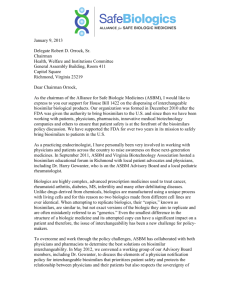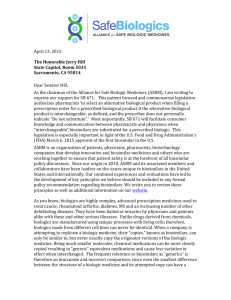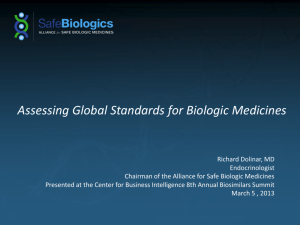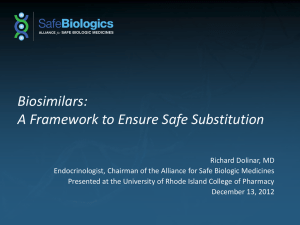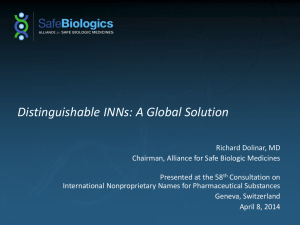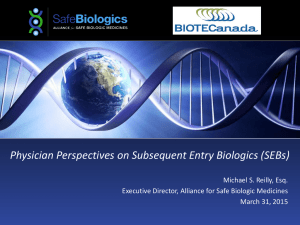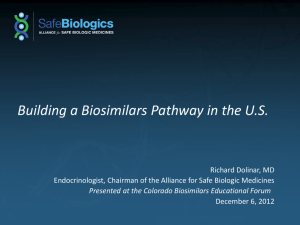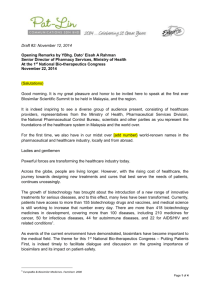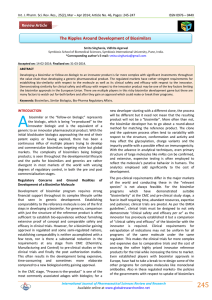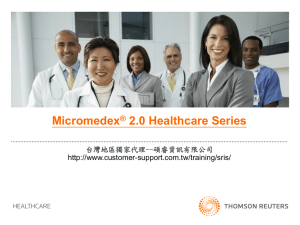February 2, 2015 The Honorable Pamela R. Lampitt 1101 Laurel
advertisement
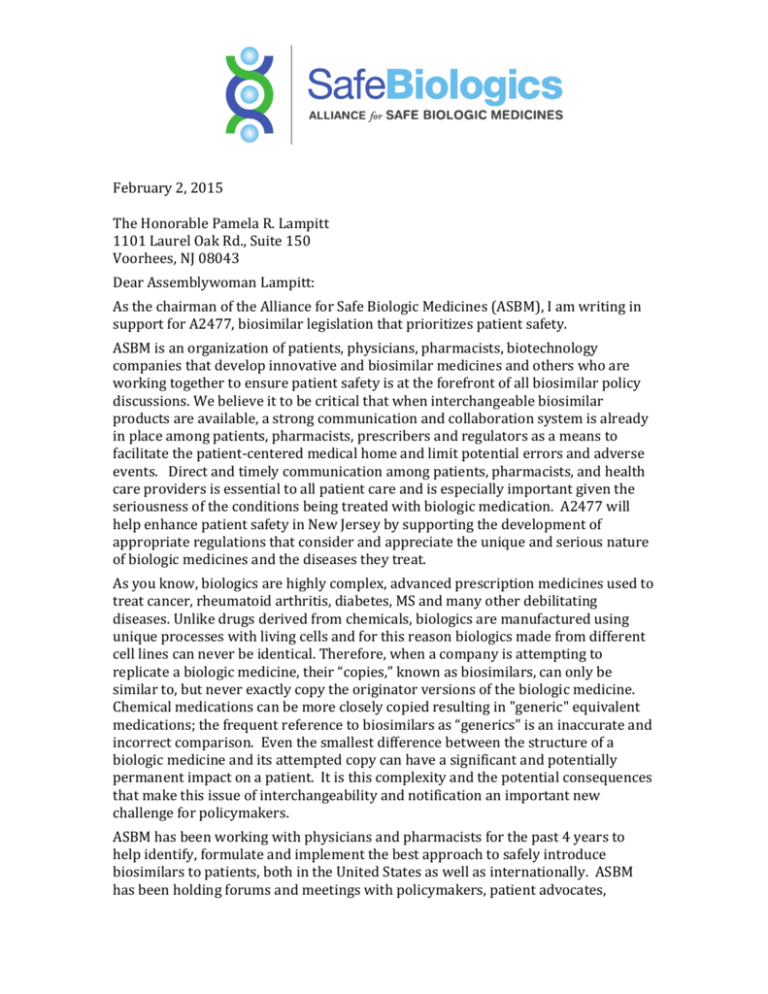
February 2, 2015 The Honorable Pamela R. Lampitt 1101 Laurel Oak Rd., Suite 150 Voorhees, NJ 08043 Dear Assemblywoman Lampitt: As the chairman of the Alliance for Safe Biologic Medicines (ASBM), I am writing in support for A2477, biosimilar legislation that prioritizes patient safety. ASBM is an organization of patients, physicians, pharmacists, biotechnology companies that develop innovative and biosimilar medicines and others who are working together to ensure patient safety is at the forefront of all biosimilar policy discussions. We believe it to be critical that when interchangeable biosimilar products are available, a strong communication and collaboration system is already in place among patients, pharmacists, prescribers and regulators as a means to facilitate the patient-centered medical home and limit potential errors and adverse events. Direct and timely communication among patients, pharmacists, and health care providers is essential to all patient care and is especially important given the seriousness of the conditions being treated with biologic medication. A2477 will help enhance patient safety in New Jersey by supporting the development of appropriate regulations that consider and appreciate the unique and serious nature of biologic medicines and the diseases they treat. As you know, biologics are highly complex, advanced prescription medicines used to treat cancer, rheumatoid arthritis, diabetes, MS and many other debilitating diseases. Unlike drugs derived from chemicals, biologics are manufactured using unique processes with living cells and for this reason biologics made from different cell lines can never be identical. Therefore, when a company is attempting to replicate a biologic medicine, their “copies,” known as biosimilars, can only be similar to, but never exactly copy the originator versions of the biologic medicine. Chemical medications can be more closely copied resulting in "generic" equivalent medications; the frequent reference to biosimilars as “generics" is an inaccurate and incorrect comparison. Even the smallest difference between the structure of a biologic medicine and its attempted copy can have a significant and potentially permanent impact on a patient. It is this complexity and the potential consequences that make this issue of interchangeability and notification an important new challenge for policymakers. ASBM has been working with physicians and pharmacists for the past 4 years to help identify, formulate and implement the best approach to safely introduce biosimilars to patients, both in the United States as well as internationally. ASBM has been holding forums and meetings with policymakers, patient advocates, physicians, pharmacists and other stakeholders across the country to discuss and educate the policy challenges associated with these next-generation medicines and the accompanying need for stringent manufacturing and notification standards to ensure patient safety and improved health. Since our origin in 2010, ASBM and its associated members and collaborators have been leaders on the issues unique to biosimilars in the United States and internationally. Our experiences and evaluations have led to the development of key principles we believe should be included in any formal policy recommendation regarding biosimilars. These principles can be found on our website. Specifically, ASBM believes regulations are needed to ensure doctors and other prescribers know what medicines are actually dispensed and administered to their patients. Physicians and pharmacists should work collaboratively in order for the safety and well-being of patients remains the top priority. It is therefore necessary for physicians to be informed in a timely fashion of the exact biologic – by manufacturer – their patient receives in order to accurately assess the medication's efficacy as well as more precisely attribute any adverse events that may occur. We have performed multiple surveys showing a gap in the knowledge about biosimilars among physicians, pharmacists and patients. It is clear that enhanced understanding and communication between pharmacists and physicians will improve the safety and efficacy of biologic products, while also advancing more treatment options to patients. To further this goal, Dr. Philip Schneider, Chair of our International Advisory Board and Associate Dean at the University of Arizona College of Pharmacy will be leading a continuing education course at the Long Island University College of Pharmacy on March 15, 2015 entitled “The Fundamentals of Biosimilars: What Every Pharmacist will need to Know” to discuss these issues. The U.S. Food and Drug Administration (FDA) has begun accepting biosimilar applications for review and is expected to approve the first biosimilar in the United States within the coming months. We have strongly supported the FDA and other regulatory bodies around the world on the creation biosimilar policies that keep patient safety at the forefront. We similarly support you and your efforts in making patient safety a priority for all citizens of the Garden State. Please feel free to contact me personally, the staff or any of the members of ASBM if you have any questions or if we can be of any additional service to you in promoting this important legislation. Sincerely, Harry L. Gewanter, M.D., FAAP, FACR Chairman, The Alliance for Safe Biologic Medicines Members: Alliance for Patient Access American Academy of Dermatology American Autoimmune Related Diseases Association Association of Clinical Research Organizations American Council on Science and Health Amgen American Association of People with Disabilities Association of Black Cardiologists Association of Gastrointestinal Motility Disorders, Inc. BIOTECanda Biotechnology Industry Organization Colon Cancer Alliance Colorectal Cancer Coalition EuropaBio Genentech Global Colon Cancer Association Global Healthy Living Foundation Health HIV Interamerican College of Physicians and Surgeons International Cancer Advocacy Network Kidney Cancer Association MANA National Hispanic Medical Association National Alliance on Mental Illness National Psoriasis Foundation RetireSafe ZeroCancer
